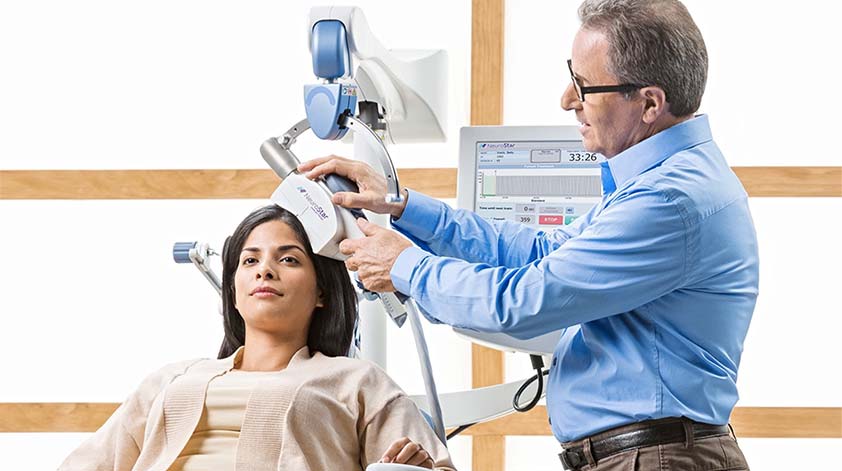
TMS therapy gives hope around the problem of mental health which is a concerning phenomenon that needs to be taken care of. Approximately 32% of people living in California have reported having anxiety and depressive symptoms in 2021. Besides, many individuals also reported suffering from mental health issues even before the pandemic.
Around 19.5% of such people had an existing mental health disorder since 2018-19. Of them, an average of 15.2% were teens and young adults. The remaining 7.2% approximately, were adults who had four or five signs of depression.
Even a few years back, mental health signs and treatments were not made clear to the world. But in the recent past, things have developed, and today there are quite a number of ways to deal with it. While medications are the least popular treatment option for a disorder like depression, different therapies are leading the way. Of them, one of the most recognized is TMS Therapy. But how good is it for treating depression? Find out more in TMS Therapy: 5 Reasons Why You Should Consider it for Depression.
What is TMS Therapy?
TMS or Transcranial Magnetic Stimulation is a non-invasive brain stimulation therapy. Over the years, TMS has proved to be effective as a potential treatment option for those having mental health conditions or even an anxiety disorder.
TMS is an FDA-cleared treatment that has been around since 1985. Its efficiency in rebalancing brain chemicals without the need for drugs and medications is considered outstanding. TMS therapy works with magnetic coils that send magnetic impulses to the brain when placed on the forehead. It sends impulses to stimulate the patient’s nerve cells in the left prefrontal cortex.
This results in changing moods, primarily to pacify critically depressed moods. Research also explains that these magnetic impulses impact the brain’s neurotransmitters. With this, the symptoms of depression can be avoided for a considerably long time.
Reasons to Consider TMS Therapy for Depression
1. No Sedation Required
Undergoing sedation or anesthesia is considered a significant health risk for many people. In fact, they are also contributing factors to a patient’s fear and anxiety levels.
Besides that, sedation or anesthesia also has various side effects, such as vomiting, cognitive dysfunction, delirium, etc. However, these are not required in TMS therapy, and as a result, several risks can be avoided.
2. Non-Invasive Procedure
Transcranial Magnetic Stimulation (TMS) therapy is a non-invasive procedure. That means the process does not require any type of surgical intervention or electrode implantation. The TMS machine sends a mild, electromagnetic pulse to stimulate target areas in the brain. The targeted areas contain the cells that are involved in mood regulation. These cells are responsible for releasing neurotransmitters like serotonin and dopamine.
The TMS machine sends waves like that of an MRI (Magnetic Resonance Imaging) scan. Therefore, one can understand that the entire procedure is completely harmless, non-invasive, and painless.
3. Reduced Chances of Side Effects
Antidepressants, although a trusted way of treating depression, still carry some severe side effects. These medications include SSRIs (Selective Serotonin Reuptake Inhibitors), SNRIs (Serotonin and Noradrenaline Reuptake Inhibitors), TCAs (Tricyclic Antidepressants), MAOIs (Monoamine Oxidase Inhibitors), etc.
However, not every individual responds to these antidepressants in the same way. For some, these medications bring bothersome side effects like nausea, low libido, insomnia, lethargy, headaches, and so on.
Those who are not satisfied with the way antidepressants work should definitely go for TMS therapy. It will likely be a better option, considering its negligible side effects. Only 10-30% of patients undergoing TMS therapy have reported having mild headaches. Also, the side effects seem to go away shortly after the therapy session ends.
4. TMS Therapy brings Quick Results
For people suffering with acute depression, TMS therapy is a very promising method that brings fast results. Unlike medications that require weeks to make dosage adjustments among other things, patients undergoing TMS therapy observe improvements within a week, or after 2-3 sessions. Around 75% of patients undergoing the therapy have evidenced a sharp decline in depression signs and symptoms in a clinical setting.
5. Non-Addictive
One of the reasons so many patients prefer this therapy is that it does not create any addictions to it. Unlike some treatments that make you feel sick, drowsy, and unable to drive your way back home, TMS therapy does not cause these issues.
Besides that, unlike some treatments that involve consuming nerve-relaxing substances like ketamine, TMS therapy is non-addictive. Often depression causes cognitive dysfunction causing patients to develop impairments. However, with the help of TMS therapy in California, that can be recovered.
Researchers have found that TMS sessions vastly improve attention, memory, and other cognitive functions and, by extension, a person’s QOL (quality of life) score.
Moreover, another reason why people choose this therapy is that it does not demand any kind of restricting recovery period. Therefore, it is well worth trying TMS therapy as one of the better (if not currently the best) ways to treat depression.
Have you suffered with depression? Would you consider the TMS approach? Let us know in the comments below, and join in the conversation on Facebook, Twitter, Instagram!









